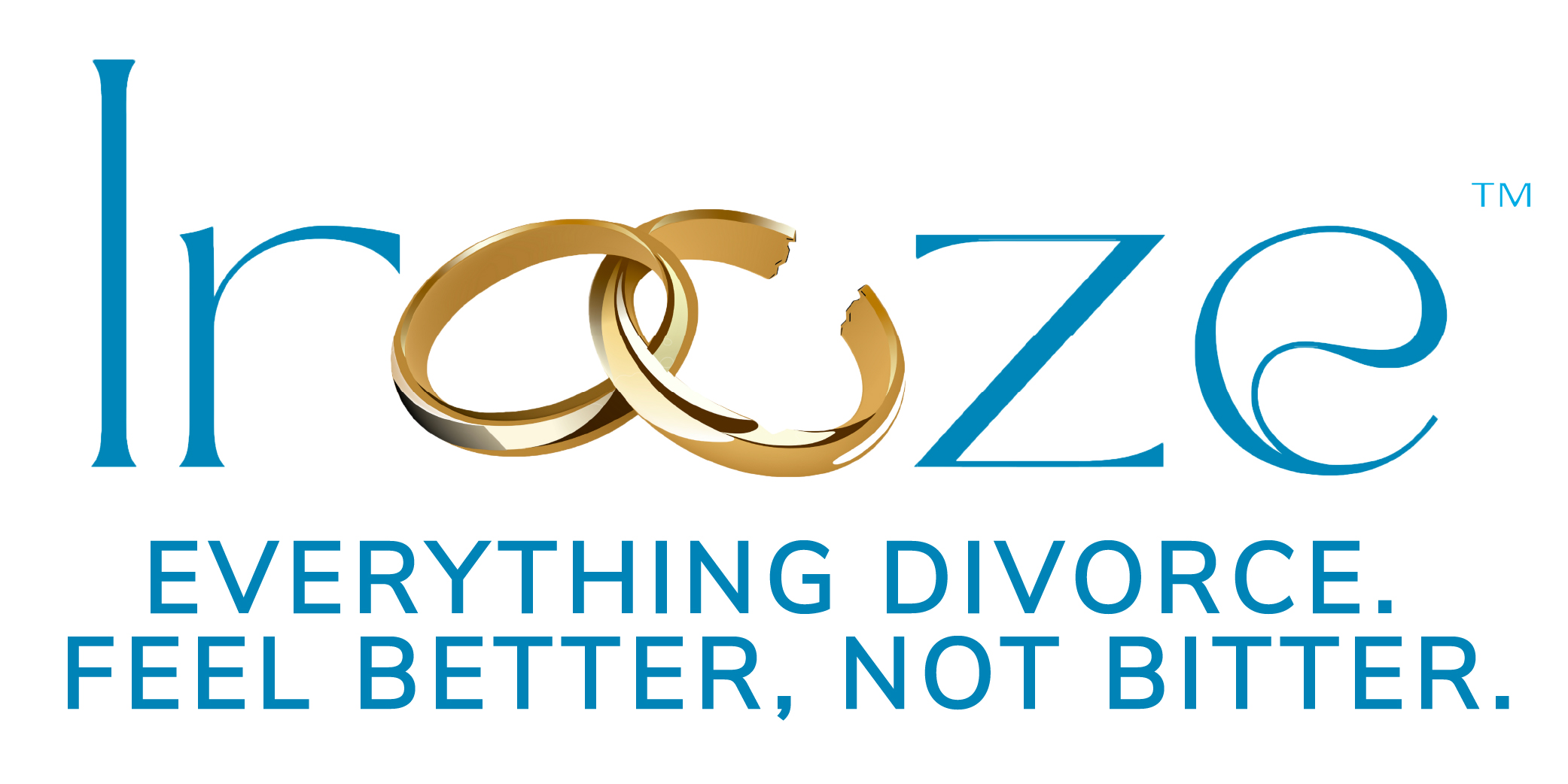
Why is divorce so hard? It’s a question people ask themselves all the time, when they’re in a bitter legal battle or just struggling with emotional pain. The truth is, divorce is difficult because it touches every aspect of your life. Changing who you are, how you feel, your financial situation, your legal standing, and your family. In this article, we’ll dive into the seven biggest challenges people face during a divorce. And we’ll offer some insights and solutions to help you get through it with strength and clarity.
Ravit Rose, Irooze Founder, shares her own experience blending how her insecurities and negative emotions carved her nasty and expensive divorce.
A Personal Story: The Unexpected Reality of Divorce
I learned painful lessons. After having spent $100,000 in legal fees and stressed out for a decade over complete nonsense, I realized that I was really wrong about my divorce from the very beginning. I was so naive, and thought “He doesn’t get along with me. We’re just not meant to be together. Let’s just each go our separate ways. He goes his way, I go my way. We each have our own individual lives.” I thought that divorce was just about that. Little did I know from one ambush after another, after another, after another, for years to come. And, that the divorce really wasn’t as easy as I thought it was going to be.
As a side note, according to the American Psychological Association, nearly 40–50% of marriages in the U.S. end in divorce. With many involving prolonged legal and emotional battles. Plus the financial costs can exceed $15,000 on average, and the emotional toll often lasts years.
Losing Your Identity During Divorce and How to Reclaim It
The experience each person lives and their understanding of why is divorce so hard varies. However, for myself, I can honestly acknowledge that I didn’t even understand myself anymore. I didn’t understand who I’d become. I didn’t understand what was going on. I was so uncertain, thoughts spinning, my mind racing. I thought I knew my reality, and I thought I understood the ex. I thought I could predict what was going to happen next.
Until I realized that I didn’t know anything. It was only years later that I started to understand what divorce was really all about. And I started to understand that I needed to know myself better. I had lost my self identity and needed to bring it back- which included knowing my boundaries; knowing what I wanted as much as what I didn’t want. I had to understand myself better, be empowered and feel more assured.
For some, the challenge lies in the emotional detachment and trauma. For others, it’s the legal complexity, loss of identity, or navigating co-parenting dynamics. Every divorce experience is uniquely painful and complicated.
The Silent Isolation of Divorce
I always felt like I was alone, even though I was surrounded by my friends and family. Everyone was giving me advice…I still felt alone. And, I still felt like people just “didn’t get me”. They didn’t understand me. They didn’t understand the situation, because whatever it was they were telling me in the outside world was not what was happening in court. Plus, it definitely not what was happening in my real life.
At first, I couldn’t understand why there was such a big discrepancy between the two- it made no sense. It was only through many years of trial and error that I finally understood that the answers lay in “me”. Over the years, I had felt like this little vulnerable insect hiding under a rock out of fear, out of frustration, out of overwhelm, out of worry, or that the worst case scenario was going to come to life. The confident, assured person that I was before had dwindled away to nothing for many years. In the process of losing myself, I gave my power away..
The Mental Health Effects of Divorce
Research from the American Psychological Association shows that divorce triggers anxiety, depression, and identity confusion. And particularly when existing emotional issues are not addressed.
If you’re feeling this way, you’re not alone. Many people report feeling isolated during divorce, even when they have external support. That’s why it’s important to recognize the mental health effects of divorce. Supporting to seek help from therapists, coaches, or peer communities who truly understand what you’re experiencing.
Take a moment and think about your situation and your self identity. Do you like what you see?
Top 7 Emotional, Financial, and Legal Challenges of Divorce

Here are an additional 7 reasons why divorce is so hard. Most people think that the biggest challenge to overcome is the emotional turmoil. But, the financial pressures and the legal process can add to the growing storm.
1. Dividing Assets and Managing Debts in Divorce
In the midst of splitting assets and resolving financial obligations, it’s important to manage this complex landscape with clarity and strategy. If this is your first time divorcing, you won’t know the smartest financial decisions to make. At Irooze, we provide you with vetted divorce trained professionals whom we know you likely do not know about (or that your attorney won’t openly advise you about).
For instance, introducing you to a Certified Divorce Financial Analyst. A CDFA® can help you understand the financial complexities involved with your specific situation and particularly understand your current and post divorce needs. They are committed to helping you make informed decisions that will ensure financial stability for your future. You can find these resources in our Divorce Directory for CDFA, mediators, therapists, and more.
They help create a budget and untangle joint assets. They also assist in dividing property while considering taxes. Step by step, they guide you through the process, empowering you to take control of your financial well-being. If you’re concerned about alimony, child support, or dividing retirement funds, the financial experts in the Irooze Divorce Directory can offer strategies to protect your interests.
2. Why You Shouldn’t Rely Solely on a Divorce Attorney for Financial Advice
When you rely on your family attorney for financial advice, you could walk into regret after the agreement is signed. Later, saying things like ;”I wish I knew” or “I wish someone told me”. To help you overcome financial challenges during divorce, understand that your family lawyer advises you on the “law”, and not on financial matters.
By arming yourself with knowledge from a divorce-trained financial professional, you can navigate the storm of divorce with confidence. And then emerge on the other side with financial security and a brighter future.
3. Challenging Divorce Negotiations Can Make the Process Much Harder
When negotiations become contentious, it can feel like sailing through treacherous waters. In these situations, it you need a clear understanding of the pitfalls and have strategies to deal with them effectively.
During divorce negotiations, emotions can run high, leading to impulsive decisions and a breakdown in communication. To reach a fair settlement, stay calm and negotiate strategically. The ideal situation for you is keeping your emotions OUT of the equation.
4. Staying Emotionally Grounded and Logical During Divorce Negotiations
This involves understanding your rights, evaluating potential compromises, and prioritizing your own well-being and the well-being of any children involved. Experienced legal professionals, like mediators, offer valuable guidance to help you make informed decisions and avoid pitfalls during negotiations.
5. How to Manage a Long Divorce Process
When your divorce becomes a long and drawn-out affair, the stress can become overwhelming. Waiting months or even years for a divorce to be finalized, along with high legal bills can take a toll on your mental and physical well-being. But fear not, there are ways to navigate this long and winding road and overcome the stress that comes with it.
It all starts with staying out of court by choosing mediation or some other form of alternative dispute resolution. More particularly, the mediation process is meant to support your pocket and speed up the divorce process by avoiding lengthy court battles and never ending wars. If you would like to explore how mediation works in your state, click here to discuss with a professional divorce mediator.
No one said divorce was easy, especially when it seems to drag on endlessly. However, with the right mindset and strategies, you can emerge from this challenging period stronger and ready to embrace the next chapter of your life.
6. Emotional and Sexual Ties in Divorce: Why Breaking the Bond Is So Hard

Divorce is a challenging journey that has mental, emotional, physical, and even spiritual effects on each spouse. The notion that two individuals who have devoted a significant time and energy into creating happiness, discovering their sexuality, and intimately integrating their lives together may now desire to separate and put an end to all that often unleashes a seismic wave of turmoil upon them.
Understanding Divorce Through a Spiritual Lens
Pushpinder Singh, spirituality advisor for the Irooze divorce community, shares his wisdom and insights are drawn from the metaphysical Eastern philosophies of thought, which sees the human being as more than just biological and physical. His perspective delves into the spiritual and energetic aspects of human beings and their relationships. He describes that when in intimate partnership, we share energetic connections and bonds with each other, which can help us understand why the pain of divorce and separation can feel so deeply painful and all-consuming. Read on as he shares how Eastern cultures perceive the connections we create during intimacy and how that impacts us when the relationship comes to an end:
ArdhAngani: The Spiritual Meaning of a Spouse
In the Eastern culture, one’s spouse is known as ArdhAngani, meaning half body. A Similar word known as “Better Half” is also used for the spouse in the West. This perspective, that one’s spouse is 50% of his/her body is Psychologically, Metaphysically & Scientifically true when one observes and understands the process of Sex. That is why, in every religion, the practice of sex is sacred. When we understand this process of sex consciously, we will automatically understand why divorce is so hard.
Sex is not just sex, in the process of sex huge chunks of memories, energies, and emotions are exchanged between a couple. In the process of sex, when they enter into each other’s bodies, their bodies are actually synchronizing with each other, and in the process, they are uniting and becoming one from the inside, they are technically becoming each other’s half-bodies or better half.
The Role of the Five Senses in Memory and Bonding
We need to observe the process of sex. When the couple is kissing each other, they are actually tasting each other, and taste is a sense that takes in information and stores it within the mind, and later on, it becomes a memory. Same way, in the process of sex, while they see each other naked, when they hear each other out while they are moaning, when they smell and touch each other’s naked bodies, memories are constantly being exchanged because Hearing, Touch, Taste, Smell, and Vision are 5 primary senses of the body, which takes in information and stores it within the mind, later on, it becomes memories.
This is just one example of how memories are exchanged between a couple in the process of sex and why sex is so sacred and not some simple process.
When a couple decides to divorce each other, they will start to feel a certain emotional turmoil within them almost immediately because their subtle body almost instantly starts to tear apart into two pieces, after all, it had already started to become one due to sex. The subtle body and the physical body are submerged into each other and hence when the subtle body tears apart, the physical body from the inside tears apart into two pieces as well.
It is not so hard to understand that if a live body is torn apart into two pieces, naturally it will be painful. This is one of the metaphysical reasons why divorce is so hard, as it is extremely painful from the inside and outside.
7. Co-Parenting After Divorce: How to Stay Civil for the Kids’ Well-Being
The aftermath of divorce often leaves deep emotional wounds that take time to heal for both parties involved. Despite the separation, there are numerous reasons why you may find yourself needing to interact with your former spouse during and even after the divorce process.
If you share children, communication is inevitable, even if it’s sometimes uncomfortable or painful. Co-parenting responsibilities, as well as events and celebrations for your children that both parents are expected to attend, will likely require ongoing interaction for many years to come.
The Importance of Civility for Co-Parenting Success
Regardless of the circumstances requiring continued contact, it’s important to find ways to maintain civility with each other, regardless of any lingering negative feelings. This can help alleviate tension and create a more positive environment for everyone involved.
Start with structured communication methods such as co-parenting apps, setting clear boundaries, and using neutral drop-off locations. Always keep the child’s emotional well-being front and center in every decision.
Children are often caught in the crossfire and find themselves bearing the emotional brunt of a divorce. Many parents mostly ignore the effects divorce has on their children as they are caught up in their tumultuous emotions and stress. Those that do pay attention usually discover that going through a divorce process with children involved is a delicate matter that requires delicacy and care which can be very hard to navigate.
How Divorce Shapes a Child’s Future Relationships
At Irooze, we understand the pains and various challenges that come with divorce. Pushpinder Singh, spirituality advisor, in his exceptional wisdom, ventures further with insights into how deeply affected children can be by their parents’ decision to divorce. The decision to separate creates a relationship model that the children witness, internalize, and carry with them into their adulthood and their own relationships, influencing their expectations and abilities. He elaborates here:
Every human being is imperfect and imperfection indicates that anyone who is imperfect makes mistakes. If a husband and a wife are getting divorced from each other after several altercations and conflicts, that means majorly they both are at fault in some or another way because both of them are human beings, and human beings are imperfect beings who commit mistakes, but in such kind of situations children are not at fault at all, they are innocent.
In such cases, it’s the children who suffer the most because they are stuck between both parents. In the majority of situations, children would never want their parents to get divorced from each other because they would be emotionally involved with both parents, they would want and need both of them together.
Generational Trauma and Emotional Emptiness
When a child is forced by his circumstances to live a fatherless or a motherless life, this situation creates huge emotional emptiness within the child’s life because majorly the child will be emotionally involved with both parents. The nature of this emotional emptiness is such that with age the size of this emptiness keeps on increasing. In such situations, after the child has become an adult, there is a high possibility that this cycle of divorce can be repeated by him in his marriage on an unconscious level because usually people unknowingly carry their baggage into their new relationship and spoil their relationship.
This aspect is known as generational traumas, those traumas that pass on from one generation to another generation, mostly on an unconscious level.
When a couple chooses to get separated from each other, they are not just planning for their divorce, unconsciously they are planning for their children’s divorce as well because as mentioned above, this cycle of divorce can be carried forward by their children in their future. This is one more reason why a couple needs to think through consciously before getting divorced. I know divorce is hard, and this perspective can make it harder, but this is one of the effects on children that we need to understand before taking a step forward towards separation.
Life After Divorce: Focusing on Healing, Growth, and New Beginnings
Keep your eye on your end goals, because life does get better. Even if it seems like you haven’t accomplished anything concrete yet, don’t lose hope. Keep a positive outlook and stay hopeful while tackling the challenges as they come. By maintaining the intent to create a peaceful way of interacting, you will notice ongoing changes in your emotions, actions, and enthusiasm for creating a fulfilling life. As those develop and take root, you’ll start to see a ripple effect on the relationships around you becoming lighter, less tense and more connected.
What are your next steps?
Divorce can be draining in various aspects. It’s usually a painful exit from something once meaningful, yet, it opens doors for a new beginning. We know divorce is hard. Separating and disconnecting yourself from a partner with whom you have shared so much time, energy, emotion and memories is a long process.
Ready to take your next step toward healing and clarity? Book your free consultation or explore our growing library of articles, tools, and support services tailored to every stage of divorce. Irooze is here to help you seamlessly transition into this new phase.
Looking for a specific professional? Make sure to check our Divorce Directory which hosts a wide variety of divorce-trained specialists in various fields to guide you through this process.
Frequently Asked Questions About Divorce
Q: Why is divorce so emotionally painful?
A: Divorce is painful because it represents a major life change involving the loss of intimacy, routine, financial stability, and sometimes self-identity. It also triggers grief and uncertainty, even if the separation was necessary.
Q: How long does it take to recover emotionally from divorce?
A: Recovery varies, but studies show that it can take anywhere from 6 months to 2 years, depending on the emotional support, legal complexity, and personal resilience of the individual.
Q: What are some common mistakes to avoid during divorce?
A: Acting out of emotion during negotiations, relying only on your attorney for all advice, neglecting your mental health, and ignoring financial planning are some of the biggest missteps.

